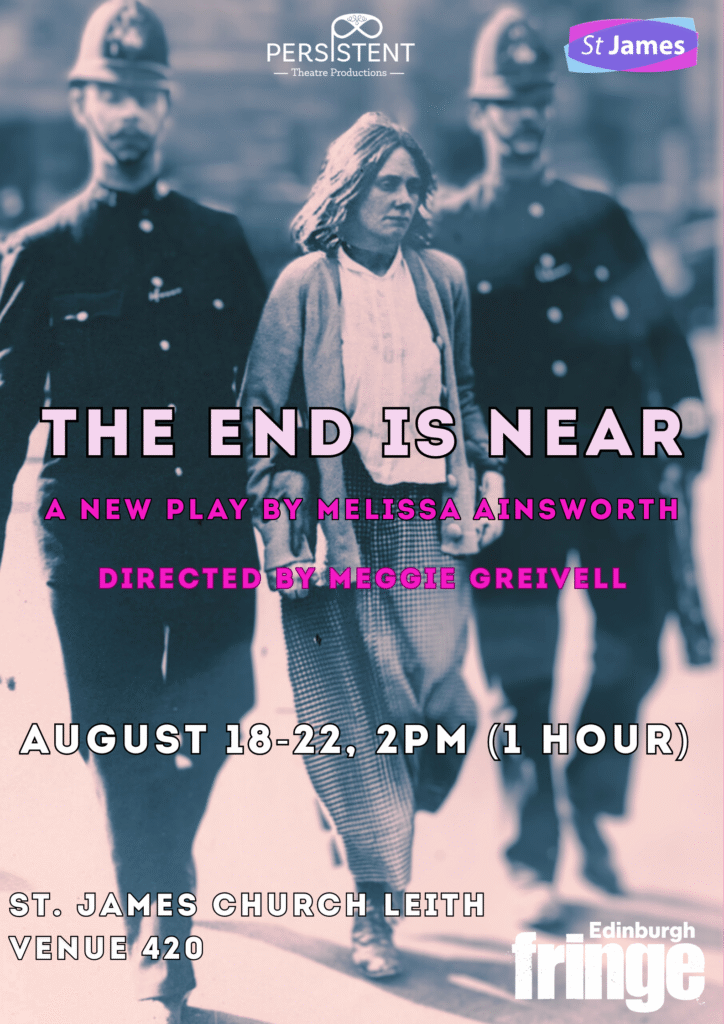In Edinburgh it’s 1661: Janet is accused of witchcraft. In London it’s 1911 and Caroline has been arrested for her suffragette activities. It’s 2028 in the USA and Lauren has been detained for having an abortion.
Melissa Ainsworth’s new play The End is Near looks at society’s centuries’ old determination to control women. As the rights gained through past suffering and protest are increasingly threatened and eroded, Ainsworth’s powerful writing shakes us awake and reminds us that the time to act is now.
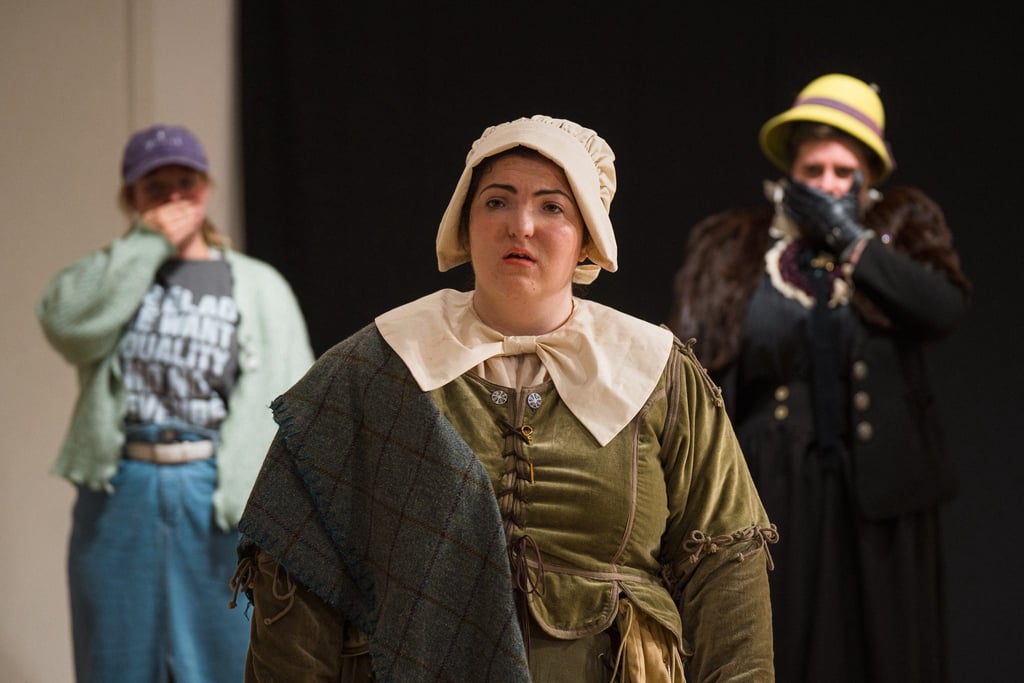 Lisa McIntyre as Janet, credit Twincity Pictures
Lisa McIntyre as Janet, credit Twincity Pictures
Each woman tells her story; each story is one of betrayal. Janet only wanted a happy life; she has no idea why she’s been locked up. Even though pregnant, Caroline is prepared to suffer to secure votes for women; her husband will come to help her soon – won’t he? Lauren is terrified and furious, ill and still bleeding. Her wife and child are in the UK; will she ever see them again? Will she die in this place?
It’s all pro-life until they see a woman dying.
Each woman’s character is well defined and nuanced, Caroline (Ainsworth)’s especially so. Dressed in fur coat and smart hat, she has all the optimism and stoicism of her class, putting a brave face on her situation, singing the suffragettes’ song. As she begins to realise that she is alone, the mask starts to slip; her graphic description of the force-feeding she is made to endure is truly horrific, but almost worse is her touching faith in her husband – ‘It is not his fault, I bet he is sick with worry…he has to be careful’ – who is clearly not going to do a single thing to save her. Her laughter becomes increasingly nervous,
What if we are just screaming into an endless pit?
Lauren (Chloe Johnson)’s backstory is particularly shocking, because it could happen – is happening – today. Traumatised by sexual assault, she travelled from conservative Indiana to a state where abortion was still legal – only to find that it wasn’t. Her outrage at what men – individually and collectively – have done to her contrasts sharply with her tragic, hopeless, longing to see her family,
In 2022 Roe v Wade was overturned by the US Supreme Court. The fight fought by Gloria Steinem, Betty Freidan and countless other women has been lost.
They said, “Oh that’s not going to happen”; it did.
Deeply regretting former choices, Lauren wonders why people, herself included, didn’t start fighting sooner, as one by one minority groups were attacked. Sound familiar? I think we all felt a little uncomfortable in our seats at this point.
Janet (Lisa McIntyre) also put her trust in a man, one who not only let her down but joined in her persecution. Janet is confused; she looks back on her happy childhood as she sits and wrings her hands in despair,
I don’t think my family could control me. Maybe that’s why I’m here.
Now she sees other women locked up with her and forced to wear the Scold’s Bridle; she knows her captors will soon be examining her for the ‘devil’s mark.’
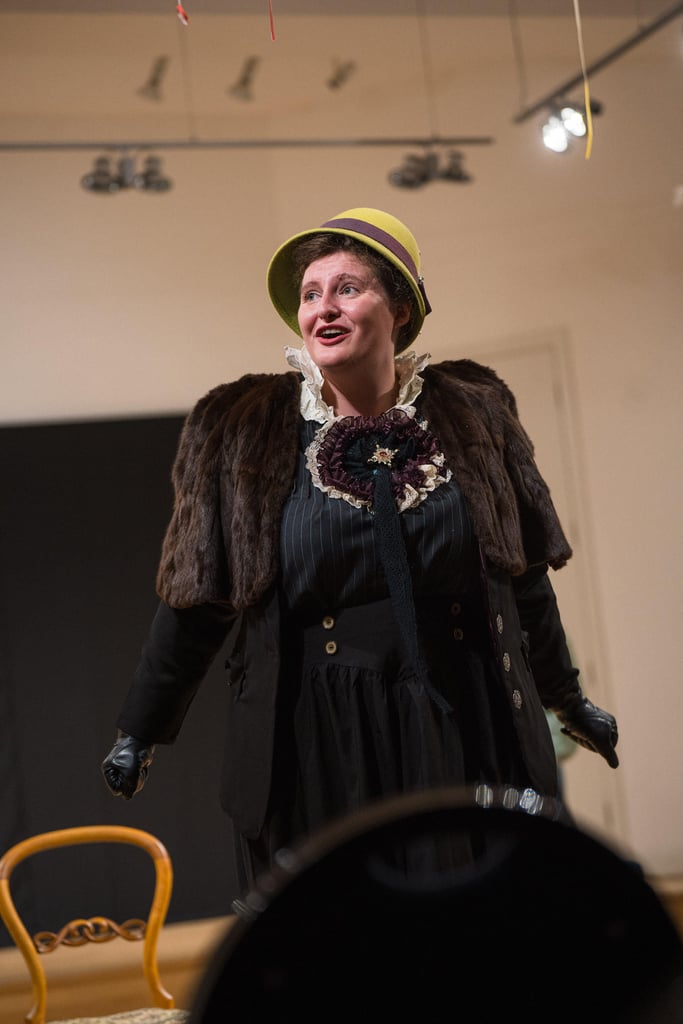 Melissa Ainsworth as Caroline, credit Twincity Pictures
Melissa Ainsworth as Caroline, credit Twincity Pictures
Janet and Caroline look from the past to the future; they have to believe it will be better. When, towards the end of the play, Caroline discovers that women did indeed get the vote seventeen years later (at least in the UK. Swiss women were not emancipated until 1972; Saudi women had to wait until 2017) she is overjoyed, but her words are prophetic,
When we get the vote, I wonder if some women will vote for their own downfall?
And of course all three women end up thinking everything that’s happened to them is their own fault. These men are clever, no?
Meggie Greivell directs this small cast well. When one woman speaks, the others remain fully aware of their positions, every gesture is controlled and meaningful. The use of little moustaches on sticks is a clever way to represent the men behind all this pain; such a small prop, but one that utterly convinces. The only slight problem I had was with the sound at the beginning of the show, when the recorded version of Bread and Roses did drown Janet’s voice out a bit, particularly when she turned to face the audience on the other side of the room, but this is always a challenge in theatre in the round.
The stage design and costumes in Towards the End are excellent. St James’s Church is a straightforward, unadorned venue (but heaps better than some of the rooms in the Old Town.) Stage Manager Sarah Wolf has kept it simple by using just two chairs and one stool, each chosen to fit the characters’ timelines. So Janet sits on a basic wooden stool, Lauren on a standard office chair, and Caroline on an early 20th century version. The real ingenuity lies in what’s seen on the floor around them. Janet’s stool is encircled by a rope; she has heard that witches are hanged before they are burned and her only hope now is that they make sure she’s dead before the light the bonfire. Around Caroline’s chair are blue ribbons and chains; she has chained herself to the railings, but now she is forcibly restrained while liquid is poured down her throat. Lauren is still bleeding; around her are red wool and knitting needles. Before abortion was legalised, those needles were used in backstreet rooms to terminate pregnancies.
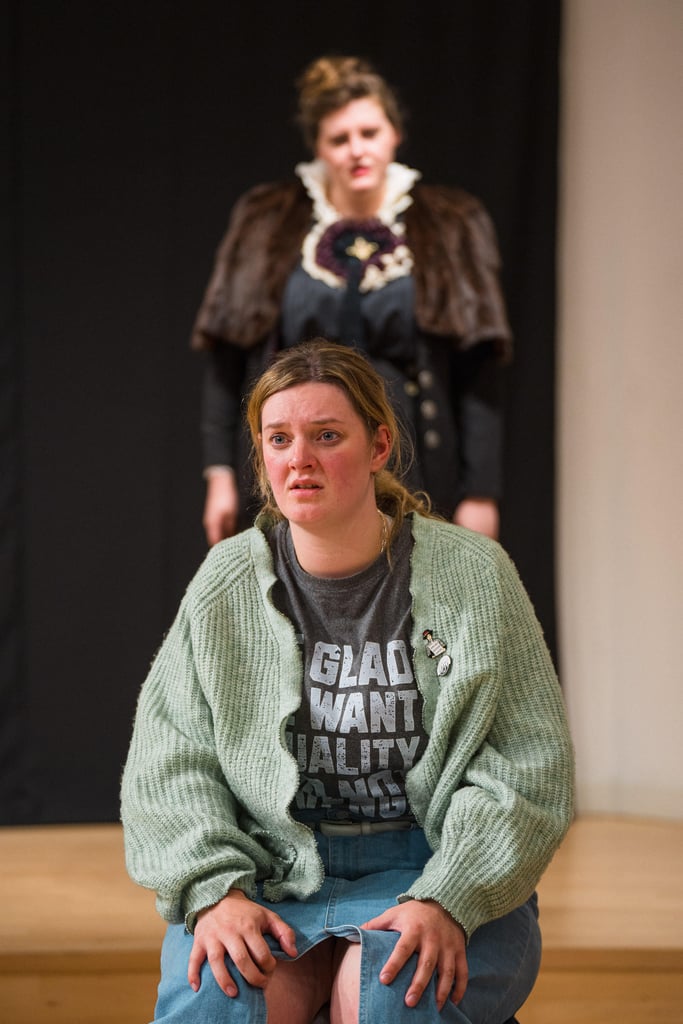 Chloe Johnson as Lauren, credit Twincity Pictures
Chloe Johnson as Lauren, credit Twincity Pictures
Costumes, impressively designed by Charlotte Bowe and skilfully produced by Erin McEwan, really add to the characters’ separate identities – again a very useful aid when audiences have to grasp everything about a play in such a short time.
The music in The End is Near is perfect. The play opens to Patti Smith’s Gloria; women don’t need anyone to die for their sins, they just want control of their own lives,
……..my sins, my own
They belong to me, me
People said, “Beware”, but I don’t care
Their words are just rules and regulations to me
Janet also sings Tam Lin, a Scottish Borders ballad and again very appropriate to the action, but my favourite is Bread and Roses, beautifully sung by Melissa Ainsworth, bringing tears to my eyes at least.
Above all we hear the loud tick of the clock, further amplified by the women’s chants, ‘Tick, tick, tick’. Each one of them knows their time is running out – but then the clock stops. Why? The women meet. How? This is another clever device, and one that still has me thinking.
I was not quite so convinced by the final scene of The End is Near; I felt the play ended on a little too positive a note. With subject matter as serious and urgent as this, it’s not necessary to tie everything up in a cheerful bow, for, as Janet points out,
I’m just a scapegoat; this is a witch hunt for eternity.
And as Lauren so rightly says,
The years keep going forward but we keep going back.
We are living in dangerous times.
The End is Near is a chilling play and a call to action. Melissa Ainsworth well deserves congratulations for her taut, multi-layered writing and excellent acting, but the whole cast and crew deserve them too; there is no weak link in this triumphant performance.
I would especially like to thank whoever produced the programme handed to us at the door; it is so useful for a reviewer to have all the information in one place – other shows please take note!
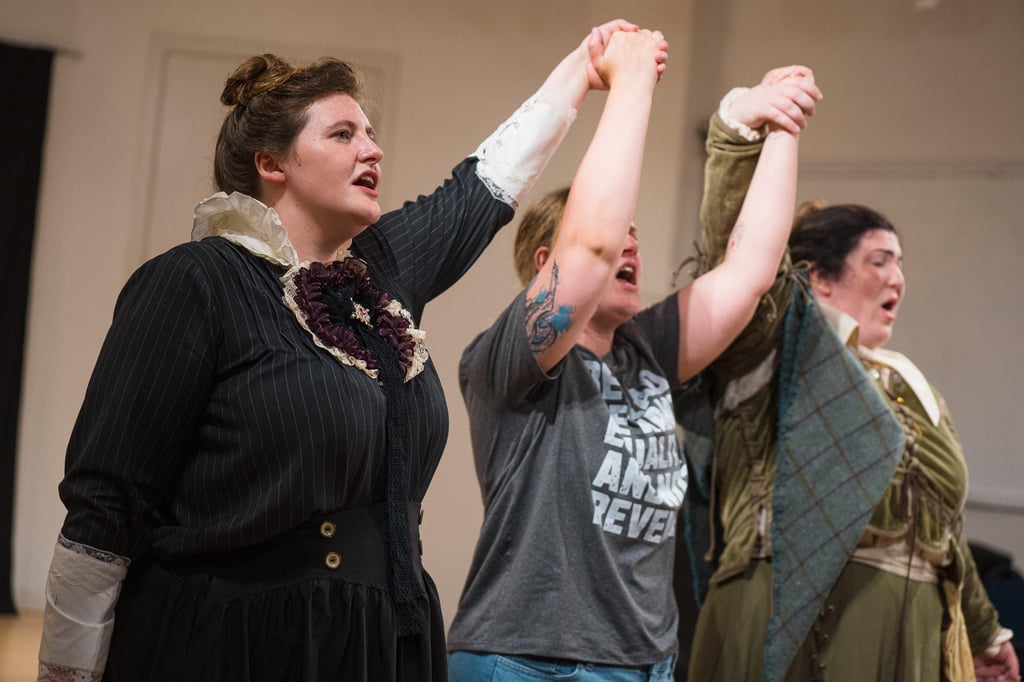 Credit Twincity
Credit Twincity
The End is Near is by Persistent Theatre Productions. See it at St James’ Church, Leith (Venue 420) at 2pm every day until 22 August. Tickets here. And don’t let getting to Leith put you off; you can take the tram from Princes Street to the Foot of the Walk, and there are also many buses from the city centre.
Please note: The End is Near contains sensitive topics, including sexual assault, violence and distress. Viewer discretion is advised.
Like Loading…
Related
